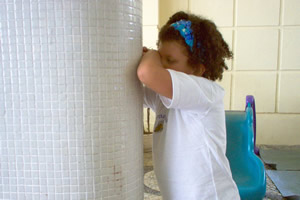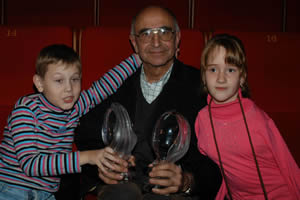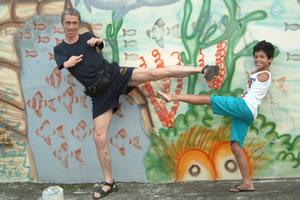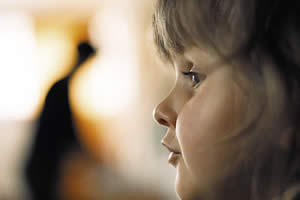Thalassa
Documentário, 11min
Brasil, 2005
Direção: Júlia Porciúncula e Liane dos Santos
Produção: Marília Nogueira
A história de Thalassa, uma menina de nove anos de idade, que nasceu com uma lesão cerebral e que, graças ao esforço de seus pais, consegue levar uma vida ativa e feliz.
The history of Thalassa, a nine years old girl who was born with a brain damage. Through the efforts of her parents, she is able to live an active and happy life.
The Life of Me
Documentário, 51min
Canadá, 2004
Direção: Manfred Becker
Produção: Susan Baker
Com que a doença mental se parece? Rachel Manning e George Vukojevic eram atores aspirantes em Nova York, até que suas carreiras foram interrompidas por doenças mentais. George teve o diagnóstico de esquizofrenia e Rachel, de distúrbio bipolar. Após dez anos em tratamento, surge uma oportunidade de voltar ao palco através do Toronto’s Workman Theatre Project.
What does mental illness look like? Rachel Manning and George Vukojevic were aspiring actors in New York City, until their careers were cut short by mental illness. George was diagnosed with schizophrenia and Rachel, with bipolar disorder. For the next 10 years, keeping their lives together became a severe challenge. But then an opportunity arose to take to the stage again through Toronto’s Workman Theatre Project.
The Collector of Bedford Street
Documentário, 34min
EUA, 2002
Direção: Alice Elliott
Produção: Alice Elliott
Documentário sobre Larry Selman, um portador de deficiência mental, vizinho da diretora Alice Elliott, que é bastante ativo na comunidade em que vivem. Quando seu único parente fica impossibilitado de ajudá-lo, seus vizinhos nova-iorquinos se juntam para proteger seu estilo de vida independente.
Short documentary about Larry Selman, Alice’s neighbour, a community activist and a fundraiser who has developmental disabilities. When Larry’s primary caregiver becomes unable to care for him, his New-Yorkers neighbours rally together to protect his lifestyle as a man living independently with developmental disabilities.
Prêmios: Indicado ao Oscar da Academia®; Jewish Image Award – Documentary Film 2003; Tash Image Award – Documentary Film 2003; Council on Foundations – Henry Hampton Awards 2002; Heartland Festival – Crystal Heart Award 2002; Ojai Film Festival – Theme Award 2002; The Black Maria Festival – Directors Choice Awards 2003 – Third Prize 2003; Freddie Award – Finalist in Special People 2003; Aspen Short Film Festival – Best Documentary 2002 – Audience Award 2002 – The Horizon Award; USA Festival – The Family Award 2002; Florida Film Festival – Audience Award, Favorite Short Film 2002, Florida Filmmaker Award 2002; Silver Street Film and Video Festival – Best Documentary 2002; Big Bear Lake Festival – Jury Prize for Best Documentary.
Liebe Perla
Dear Perla
Documentário, 53min
Israel, 1999
Direção: Shahar Rozen
Produção: Edna Kowarsky e Eden Productions
Esta é a história da amizade entre duas mulheres anãs. Perla, atriz, é a última remanescente de uma família judia de anões que formava uma trupe musical e que sobreviveu às experiências do Dr. Mengele em Auschwitz. Hannelore nasceu na Alemanha do pós-guerra e está fazendo uma pesquisa que pode realizar um sonho de Perla. Ela procura por um filme produzido pelos nazistas com a família de Perla, no qual todos os membros da família aparecem nus sobre um palco diante de um grupo de oficiais da SS. Enquanto pesquisa nos arquivos da Alemanha e da Polônia, Hannelore se corresponde com Perla, relatando o andamento de sua busca.
This is the story of a friendship between two very short women. Perla, an actress, is the last living member of a Jewish family of dwarfs that survived Dr. Mengele’s experiments in Auschwitz. Hannelore was born in postwar Germany. Hannelore sets out on a quest, which could well fulfill one of Perla´s greatest dreams. She is searching for a lost Nazi film of Perla’s family, standing naked on stage, before a group of high-ranking SS officers. As she hunts for the film in German and Polish archives, Hannelore corresponds with Perla to report on her progress.
Prêmios: Prize for best script – Haifa Film Festival; Israel Magnolia prize for best documentary – Shanghai Film Festival; Best film award – Turk Festival in Turkey.
O Lyubvi
About Love
Documentário, 26min
EspaçadorRússia, 2003
EspaçadorDireção: Tofik Shakhverdiev
Em uma escola para portadores de deficiência na Rússia, crianças divertidas falam sobre suas vidas, especialmente sobre namoro e amor.
In a school for disabled children in Russia, some creative and funny kids talk about their lives, and specially about love.
Prêmios: Grand Prix – “Stalker”, Special Prize and Prize of Viewers Appreciation – “Cinema Without Barriers”, First Prize – “Message to Man”, St. Petersburg, First Prize Festival of Russian Cinema in France, First Prize Festival – “Flaertiana”, Perm.
In the Middle of the Way
Documentary, 26min
Brazil, 2002
Director: André Costa e Silvio Cordeiro
Producer: Danilo Concílio
O documentário apresenta o cotidiano de quatro pessoas com dificuldades de locomoção, discutindo o tema da acessibilidade na Grande São Paulo.
The documentary presents the routine of four locomotion-impaired people, discussing the issue of accessibility in São Paulo City.
Prêmios: 2º lugar júri técnico no VI VIDEVÍDEO – Festival Nacional de Cinema e Vídeo da UFRJ; Melhor Roteiro no Festival Cearense de Vídeos Universitários NÓIA
Mama Wahunzi
Documentário, 57min
Tailândia e EUA, 2002
Direção: Lawan Jirasuradej
Produção: Lawan Jirasuradej
Em 1997, em Uganda e no Quênia, cem mil pessoas estavam sem cadeiras de rodas, e as mulheres tinham acesso a apenas um por cento das disponíveis. Três mulheres decidiram que seus destinos dependiam de suas mãos. Elas aprenderam a construir cadeiras de rodas – assegurando assim sua própria mobilidade.
In 1997, in both Uganda and Kenia, one hundred thousand people were without wheelchairs, and women had access to only one percent of those available. Three women decided to take their fate into their own hands. They learned how to built wheelchairs – thus ensuring their own mobility.
Prêmios: Audience Awards at African American Women in Cinema Film Festival and African Studies Association Conference, USA 2003; Merit Award at Superfest, USA 2004; Cultural Grant, Asian-Europe Foundation to attend Torino International Women Film Festival – Turin, Italy 2003.
Happy Birthday Thalidomide
Documentário, 48min
Brasil e Reino Unido, 2004
Direção: Kim Flitcroft
Produção: Kim Flitcroft
Relato pessoal de Mat Fraser, que pertence à primeira geração de pessoas que adquiriram algum tipo de deficiência pelo uso de talidomida por suas mães durante a gestação. Numa viagem ao Brasil, Mat conhece várias gerações afetadas pela talidomida, investiga o uso da droga e conhece mulheres que ainda a usam.
Happy Birthday Thalidomide is 1st generation Thalidomide victim Mat Fraser’s personal history of the original drug scandal, before he sets off to Brazil, where he meets many original, then 2nd, and even 3rd generation Thalidomide victims there. He investigates its use and meets women who are still taking it.
A Child Unlike any Other
Documentário, 11min
Canadá, 2005
Direção: Anna Barczewska
Produção: Claudette Jaiko
Jan Maka era uma criança feliz e cheia de energia – uma criança como outra qualquer. Do dia para a noite, a vida de sua família vira de cabeça para baixo quando se descobre que ele é “diferente”: Jan é autista. Como é viver com uma criança afetada por essa desordem neurológica? O contundente curta de Anna Barczewska descreve a luta de todos os pais de crianças com autismo.
Jan Maka was happy, energetic – a child like any other. Overnight, his family’s life was turned upside down when it was discovered that he was “different”: Jan has autism. What is it like to live with a child affected by this neurological disorder? Anna Barczewska’s poignant short film puts a human face on the little-known condition and, through one family’s story, depicts the struggle of all parents of children with autism.
A Life to Live
Zycie Przed Toba
Documentário, 20min
Polônia, 2003
Direção: Maciej Adamek
Produção: Radek Stys
Um filme sobre crianças portadoras de deficiência visual sendo preparadas por seus professores para uma vida independente. Podemos observar as crianças durante suas atividades diárias, quando elas aprendem a abotoar a roupa, amarrar os cadarços, reconhecer sons e objetos e cozinhar. Entrevistadas, elas falam sobre o que querem ser quando crescer e mostram acreditar que não existem barreiras ou limites para elas.
The film is about blind children being prepared for an independent life by teachers at a Center for Blind People. We can observe the children during their everyday activities, when they learn how to button up, tie their shoelaces and recognize sounds and objects. They also speak about their expectations for the future. The things that are obvious and easy for people who can see, for them, are often very complicated.
Prêmios: 12 awards at festivals: Best Short Documentary at Palm Springs, San Francisco, Buster Film Fest, Blue Sea Film Fest and Audience Award at Washington, Stockholm Film Festival.
Programa Especial do Assim Vivemos 2007: Homenagem Maciej Adamek
